In this edition of court judgements review, we look at the Supreme Court’s judgements on territorial jurisdiction of the PMLA court, regularization of employees and the non-application of the general strict liability principle in case of an insurance policy, Delhi High Court’s judgement on ‘virginity test’ and Jammu and Kashmir and Ladakh High Court’s judgement challenging the Government order on closure of ReT scheme.
Supreme Court: PMLA court has the jurisdiction to try cases involving money laundering regardless of where the accused first obtained possession of the proceeds of crime.
In Rana Ayyub vs. Directorate of Enforcement, the apex court held that when there is a factual dispute on the place of commission of offence, the issue of territorial jurisdiction cannot be decided in a writ petition. It allowed the petitioner to approach the Trial Court and raise the issue of territorial jurisdiction.
The two-judge bench of the Supreme Court comprising of Justice J.B. Pardiwala and Justice V. Ramasubramanian, was hearing a writ petition filed by Rana Ayyub challenging the summoning order of the Special PMLA Court of Ghaziabad, on a complaint filed by the Directorate of Enforcement under sections 44 and 45 of the Prevention of Money Laundering Act, 2002, alleging that money collected for relief efforts was misappropriated. The Counsel for the petitioner made it clear that the challenge to the order by way of a writ petition is limited to the question of territorial jurisdiction alone and not on any other grounds.
The petitioner argued that an offence punishable under the Act shall be triable only by the Special Court constituted for the area in which the offence has been committed as per Section 44(1) of the PMLA, 2002. The petitioner relied on the judgement of the apex court in Vijay Madanlal Choudhary & Ors. vs. Union of India & Ors., wherein it was decided that the trial of the offence of money laundering should proceed before the Special Court constituted for the area in which the offence of money-laundering has been committed and that in case the scheduled offence is triable by the Special Court under a special enactment elsewhere, both the trials need to proceed independently, but in the area where the offence of money laundering has been committed.
However, the counsel for the respondent argued that there were several victims under the jurisdiction of the special court in Ghaziabad, and a part of the cause of action has arisen within its jurisdiction, hence the question of territorial jurisdiction does not arise. The Court, upon hearing both counsels, held that:
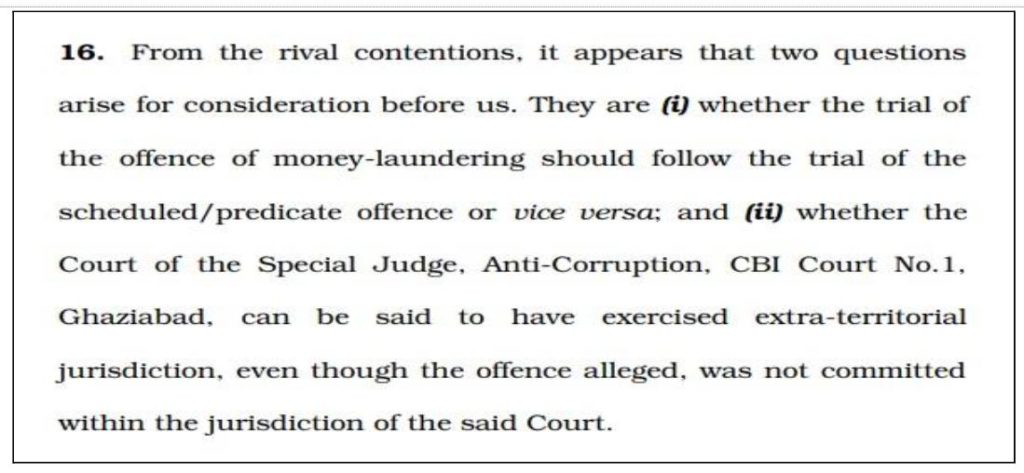
On the first question, the court referred to sections 43 and 44 of the PMLA, 2002, which deals with the special courts and offences triable by Special Courts. The court distinguished ‘offence’ and ‘scheduled offence’, wherein the offence connotes the offence of money laundering while scheduled offence connotes predicate offence. Further, looking at the provisions of the act, the Court held that the trial of the scheduled offence, insofar as the question of territorial jurisdiction is concerned, should follow the trial of the offence of money laundering and not vice versa.
For deciding the question of territorial jurisdiction of the court, the apex court relied on Kaushik Chatterjee vs. State of Haryana. It was held that the issue of jurisdiction of a court to try an “offence” or “offender” as well as the issue of territorial jurisdiction, depends upon facts established through evidence and that if the issue is one of territorial jurisdiction, the same has to be decided with respect to the various rules enunciated in Sections 177 to 184 of the Code of Criminal Procedure. Accordingly, the apex court dismissed the petition.
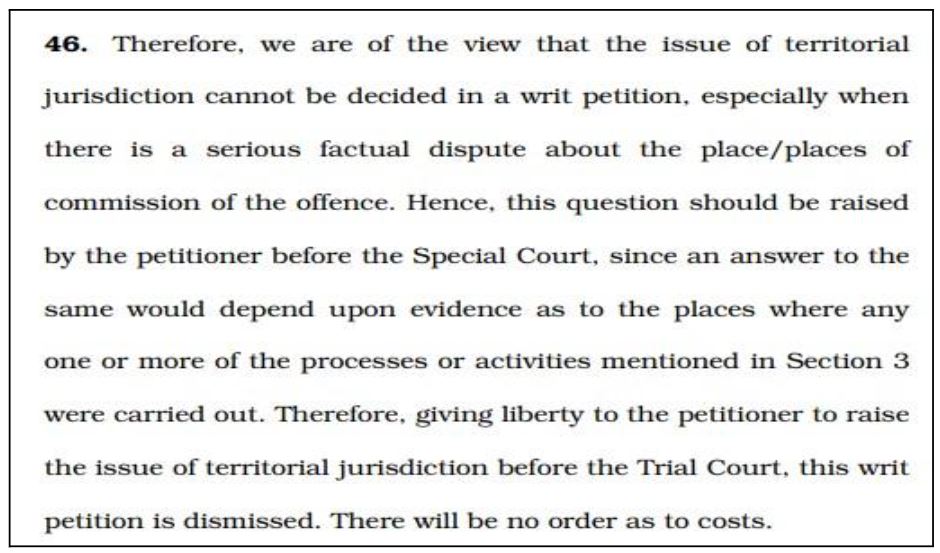
Supreme Court: Appointment by a competent authority and the presence of a sanctioned post are a must for any employee seeking Regularization.
The Supreme Court, in Vibhuti Shankar Pandey vs. State of Madhya Pradesh & Ors., held that an employee cannot seek regularization if the initial appointment was not made by a competent authority and there is no sanctioned post.
A bench of Justice S. Ravindra Bhat and Justice Sudhanshu Dhulia was hearing an appeal filed by the appellant against the judgement of the Division bench of the Madhya Pradesh High Court that set aside the regularization benefit granted to the appellant by a learned single judge. The appellant was hired as a supervisor in 1980 on a daily rated basis and sought regularization of his post as a supervisor, for which the minimum essential qualifications were matriculation with mathematics. The appellant did not possess such qualifications. While the qualifications were relaxed later by a Government Order, the Madhya Pradesh High Court in an earlier writ petition directed the state government to decide on the claim of regularization in accordance with the law.
However, the Office of Chief Engineer, Rani Avanti Bai Lodhi Sagar Project, rejected the regularization plea by the appellant as the appellant was not appointed against any post and an initial appointment was not made by the competent authority. However, juniors to the appellant were regularized due to which the appellant set a claim for his regularization, which was accepted by the single judge bench of the Madhya Pradesh High Court and allowed for regularization of the appellant from the date on which the juniors were regularized.
The Division bench set aside the order of the single judge after the state government challenged it, as it did not follow the principles of law laid out by the apex court in Secretary, State of Karnataka, and Ors. vs. Umadevi and Ors. The two principles laid out are:
- Initial appointments must be made by a competent authority.
- Availability of a sanctioned post
The Apex Court held that the Division Bench was right in allowing the appeal and setting aside the order of the learned single judge. Accordingly, the appeal is dismissed.

Supreme Court: A proximate causal relationship between the accident and the body injury is a necessity for any injury to be included within the parameters of the ‘Scope of Cover’ in the insurance policy defining when such insurance amount would become payable.
The apex court in National Insurance Company Limited vs. The Chief Electoral Officer & Ors. held that death occurring due to sun-stroke is not covered under the clause 3 of the insurance policy, which read, ‘The insurance is intended to provide for the payment of compensation in the event of death only resulting solely and directly from an accident caused by external violent and any other visible means’, and a proximate causal relationship between the accident and bodily injury is must for any injury to be included under the ambit of the above clause.
A two-judge bench comprising of Justice SK Kaul and Justice AS Oka, was hearing an appeal against the decision of Patna High Court, which granted relief to the wife of the officer who died due to sunstroke while discharging election duties. The National Insurance Company entered into an MoU with the Chief Electoral Officer (CEO), Bihar to provide insurance coverage to persons deployed for election work in the 2000 Bihar Assembly Elections. The State Government opted for a group insurance scheme.
The single judge of the Patna High Court held that since the policy duration is expired, no such direction could be given for the payment of the insurance amount. However, since the state Government failed to realize its primary responsibility to raise the claim during the policy term, the liability to pay the amount to the wife was assigned to the CEO, Bihar, and District Magistrate. The CEO filed an appeal against this order.
Upon hearing the arguments by the counsels on both sides, the apex court held that insurance contracts are a unique class of contracts with characteristics that are common to all forms of insurance, including the highest degree of good faith, insurable interest, indemnity subrogation, contribution, and proximate cause. The words used in an insurance contract are said to be of utmost importance, and the court is not permitted to add, remove, or alter any language as held by this court in Suraj Mal Ram Niwas Oil Mills Pvt. Ltd vs. United India Insurance Co. Ltd and Anr. The contract’s provisions must be interpreted carefully, without changing its fundamental terms because doing otherwise could harm the parties’ respective interests. An insurance policy’s provisions must be read in their entirety as reiterated by the apex court in Vikram Greentech (I) Ltd. & Anr vs. New India Assurance Co. Ltd.
The court looked at the specific clause of the MoU that governed the payment of insurance amount in case of death (only) resulting ‘solely and directly’ from the accident caused by external violence and any other visible means.
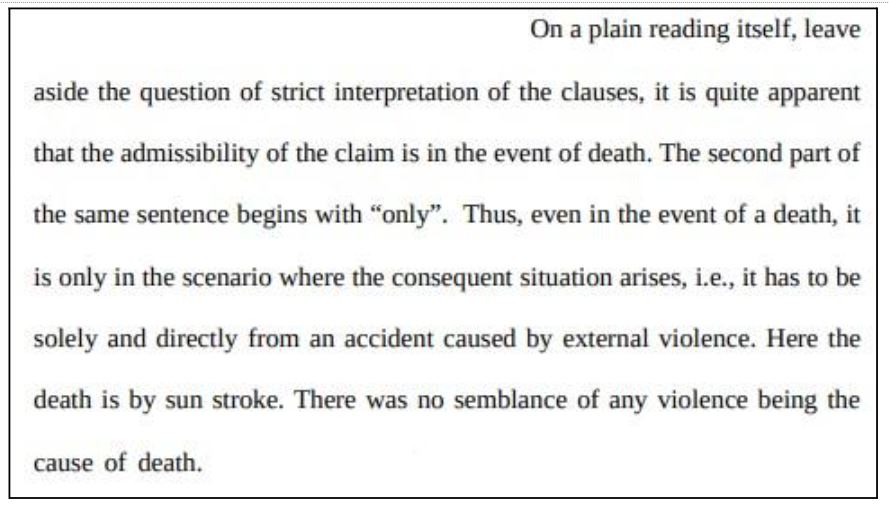
Further, the apex court relied on judgement in Alka Shukla vs. Life Insurance Corporation of India, whereby it was held that.
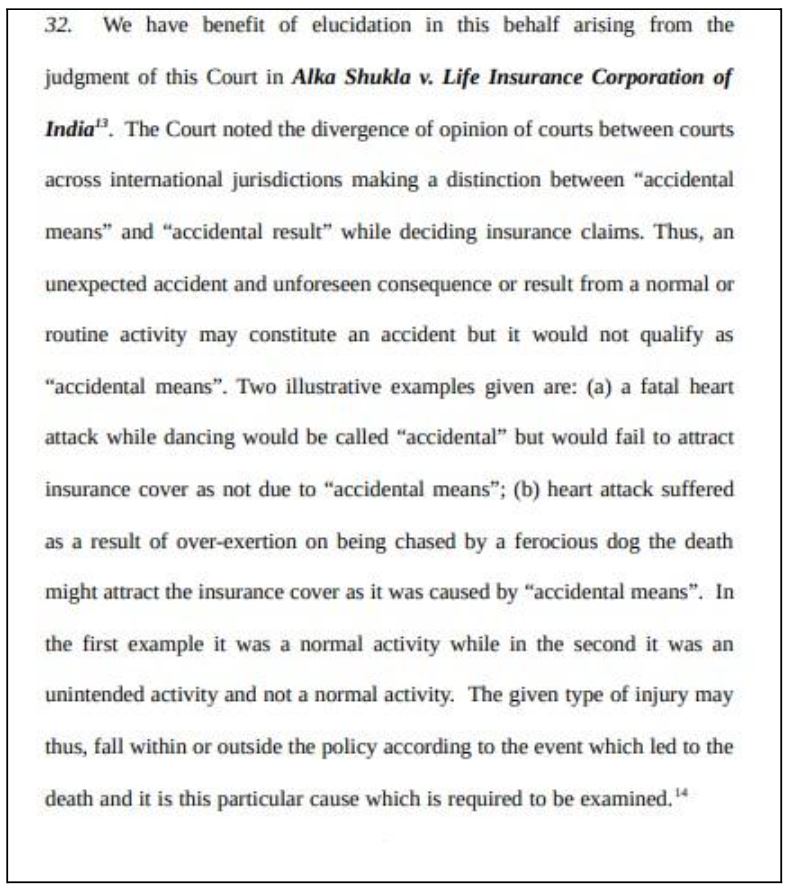
Accordingly, the court held that when the policy is examined in the aforementioned context, the cause of sunstroke cannot be included within the confines of the “Scope of Cover” in the insurance policy defining when such insurance amount would become payable because there must be a proximate causal relationship between the accident and the body injury. It further held that the appellant’s insurance company is not liable. Accordingly, the judgement of the Division Bench of the Patna High Court was set aside, and an appeal was allowed.
Delhi HC: The virginity test conducted on a female detainee, accused under investigation, or in custody, whether judicial or police, is unconstitutional and in violation of Article 21 of the Constitution which includes right to dignity.
The Delhi High Court, in SR. SEPHY vs. CBI & ORS, held that the virginity test is unconstitutional and violates the Right to Dignity under Article 21 of the Indian Constitution. The court further held that such a test is ‘sexist’ in nature and does not have medical standing as held by the apex court in several judgements.
The court was hearing a plea filed by the petitioner challenging the constitutional validity of the virginity test done on her. The petitioner alleged that the CBI officers forcefully obtained her consent for a virginity test, thereby subjecting her to mental torture. It is further alleged that the CBI had run a malicious campaign against her as the results of the virginity test were counter to the allegations of the CBI.
The respondents argued that the petition is not maintainable as the appeal against the conviction of the petitioner is pending in Kerala High Court. They also opposed the submission of the petitioner that the present petition is independent of the trial in the High Court. The counsel for the petitioner argued that Article 226 (2) confers an additional power on every High Court to issue writs throughout its territory within which the cause of action wholly or in part arises. They further argue that there was no necessity to conduct this test in connection with the criminal case and are seeking disciplinary action and compensation to be paid to the victim as well as the constitutional validity of this test being conducted on a female under interrogation.
Upon hearing the arguments by both petitioners and respondents, the Single judge bench of Delhi High Court, led by Justice Swarana Kanta Sharma, agreed with the petitioner that constitutional remedies cannot be denied on the ground that criminal trial is pending at some other place.
The court relied on the apex court judgement in Lillu (Rajesh) & Anr. vs. State of Haryana, whereby it is held that the ‘two-finger test’ is violative of the right to dignity, integrity, and privacy of victims of sexual assault, and under the ‘Guidelines & Protocols: Medico-legal care for survivors/victims of sexual violence’ issued by Ministry of Health and Family Welfare, Government of India in the year 2014, any person conducting the ‘two-finger test’ shall be in contravention with the directions of the apex court. Further, in the State of Gujarat vs. Rameshchandra Ramabhai Panchal, 2020, the ‘two-finger test’ was declared unconstitutional. It held that medical procedures should not be carried out in a manner that constitutes cruel, inhuman, or degrading treatment and health should be of paramount consideration while dealing with gender-based violence.
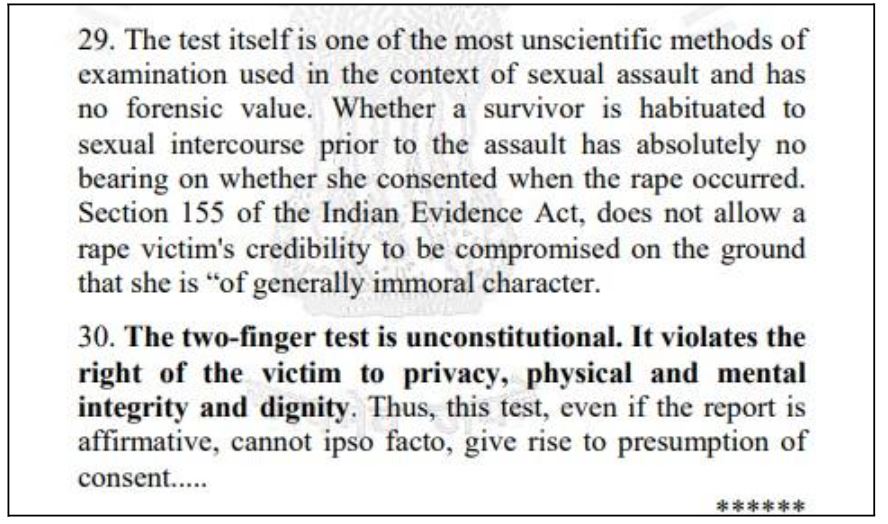
The court further held that the ‘virginity test’ does not find a mention in the section 53, 53(A), and 54 of the Code of Criminal Procedure, 1973.
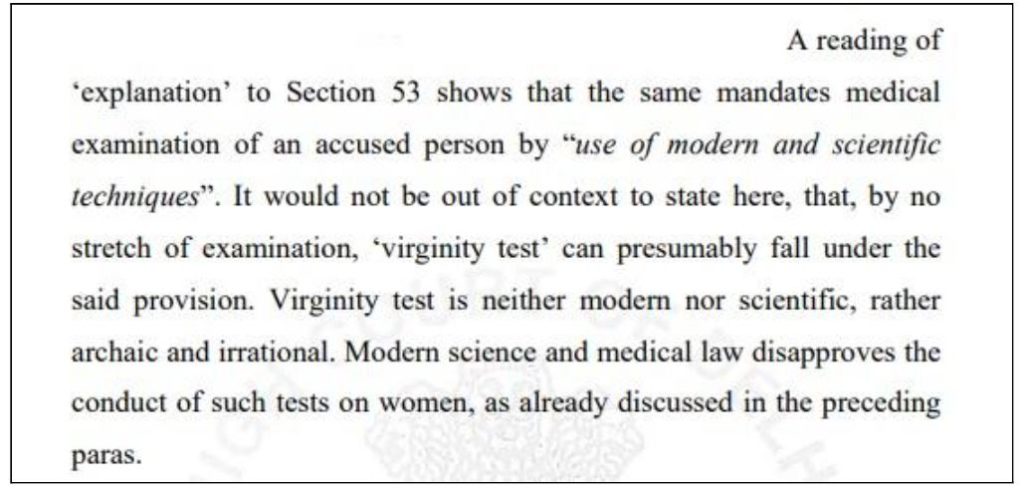
The court held that even the accused have fundamental rights, and they are not suspended so far as the question of their privacy and dignity is concerned as held by the apex court in several judgements.
Accordingly, the ‘two-finger test’ is held unconstitutional. However, as it was not barred in law or by any judgment to have got it conducted, howsoever despicable or deplorable the practice may have been, the court suggested the petitioner take an alternative course of action against CBI. Further, it suggested approaching the National Human Rights Commission once the trial ends.
Jammu & Kashmir and Ladakh HC: Permitting the Executive to review, revise or sit over the decisions of the Court by issuing executive orders or instructions would be tantamount to interference with the exercise of judicial functions by the Judiciary.
In Rukhsana Jabeen vs. State of J&K, the Jammu and Kashmir High Court held that in the constitutional scheme that we have, the executive is under an obligation to obey the judicial orders. Permitting the executive to review, revise or sit over the decisions of the Court by issuing executive orders or instructions would be tantamount to interference with the exercise of judicial functions.
The two-judge bench comprising of Justice Sanjeev Kumar and Justice Moksha Khajuria Kazmi was hearing a petition challenging a Government Order prescribing closure of the Rehbar-E-Taleem Scheme announced in the year 2000.
By passing a Government Order No. 396-Edu of 2000 on 28 April 2000, the Government of J&K established the “Rehbar-E-Taleem” (ReT) Scheme. The idea of ReT Scheme was to involve the community in the implementation of a system of decentralised administration and elementary education. The programme further stipulated that the candidate would be qualified for employment as a ‘General Line Teacher’ in the Education Department after satisfactorily completing five years of service as a ReT on an honorarium basis. After determining that the ReT Scheme’s goal had been achieved, the government issued Government Order dated 24 November 2003, halting the process of filling teacher vacancies in the school through the ReT Scheme.
There were petitions pending before the High Court challenging the engagement of ReTs, and while these were pending adjudication, the Government issued the impugned order directing the closure of the ReT Scheme and providing therein the impact, effect, and consequences of the closure of ReT Scheme. Upon hearing the arguments from both sides, the court upheld the validity of the Government Order.

However, after considering the petitioners’ argument that the respondents are refusing to benefit from concluded judgements issued by this Court because they cannot be executed in light of the execution of the impugned Government order, the court noted that permitting the executive to sit over the judicial orders tantamount to judicial interference, and the executive, as said above, is bound to comply with the orders of the Court and has no power, jurisdiction or competence to sit over or overturn such a decision by mere executive fiat.
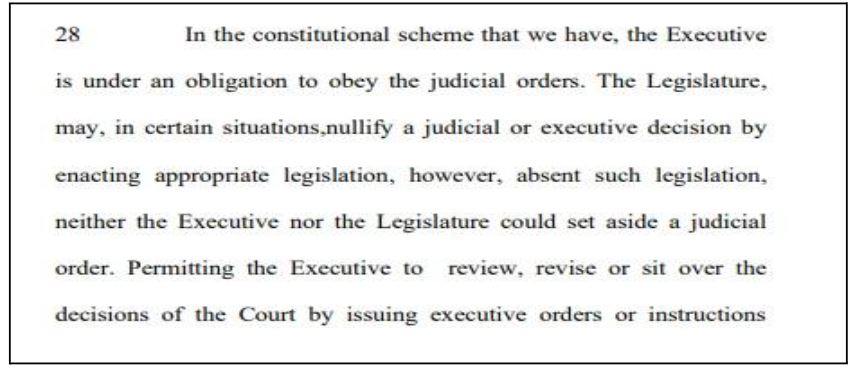
On the pending appeals before the court, the High Court held that impugned Government Order will not override or effect the judgments passed or to be passed by this Court holding a candidate/candidates entitled to engagement in the selection process which was/is under challenge before the Court.
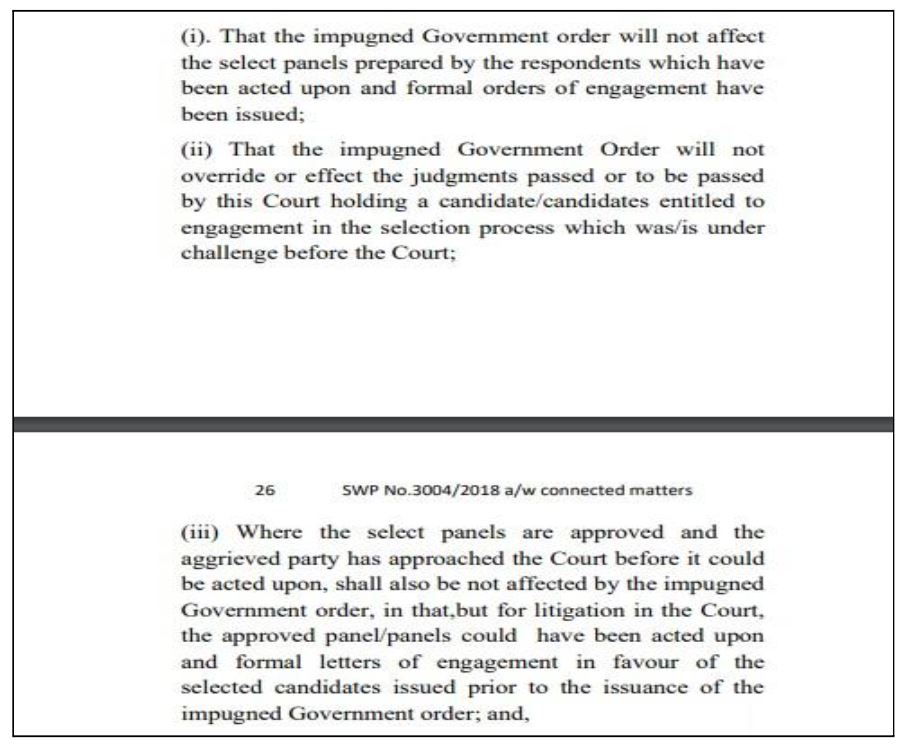
Accordingly, the challenge to the constitutionality of the impugned Government Order failed and consequently, all the petitions were disposed of.


